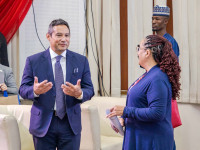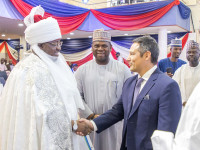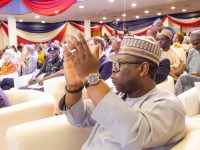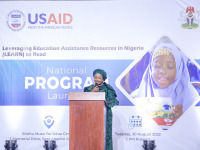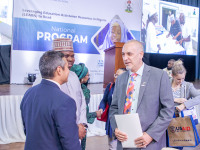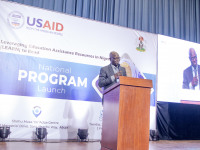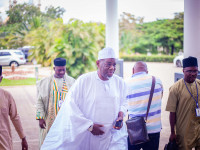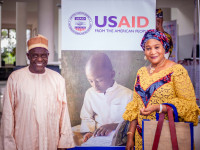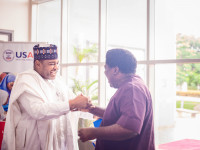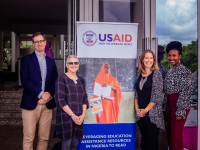New Early Grade Reading Program Kicks Off in Nigeria, builds on the success of previous collaborative educational programs
Abuja, Nigeria – A new five-year education project that will provide technical assistance in support of continued and sustainable reading outcomes for first and second grade students in the country launched before a gathering of more than 250 educators, government officials and international donors.
Funded by the U.S. Agency for International Development, the new Leveraging Education Assistance Resources in Nigeria (LEARN to Read) program will foster global and local best practices for the ownership, sustainability and improvement of teaching and learning of early grade reading gains initially in the states of Bauchi and Sokoto, followed by other locations.
During the Aug. 30, 2022, official launch of the new USAID-supported program, the Permanent Secretary of Nigeria’s Federal Ministry of Education pledged the government’s support to the new endeavor.
“Such an initiative is no doubt adding value to the efforts put in place by the Ministry of Education,” said David Adejo Andrew, the Permanent Secretary of Nigeria’s Federal Ministry of Education during keynote remarks at the ceremony. “I want to assure you that the federal government of Nigeria with partnerships with the states, will continue to provide the necessary environment to improve the education sector. With the support of development partners like USAID, I’m sure that Nigeria will steadily move toward attaining its sustainability goals.”
The Emir of Bauchi, Alh. Dr. Rilwanu Suleiman Adamu, told attendees during the official launch, that “now that LEARN to Read is here with a national outlook, I hope our governments at all levels would support and sustain the initiative.”
“Let me pledge our support and commitment in any possible way for this development initiative in our states, particularly in education which has been the bedrock for sustainable development,” the Emir of Bauchi said.
Implemented by Creative Associates International and partners, the USAID-supported LEARN to Read program will use an approach that places the child at the center of the process of learning, enabling whole-child support via safe, equitable school environments, said Nurudeen Lawal, LEARN to Read’s Chief of Party, at the event.
“The implementation will focus on differentiated, inclusive instruction that supports the development of materials that will be language-, context- and level-appropriate and will be made available to every child,” said Lawal. “This ecosystem approach is aimed at uniting and transforming attitudes and behaviors at all levels to foster ownership and sustainability.”
Creative’s President and CEO, Leland Kruvant, highlighted the importance of this technical support program and its goals for Nigeria’s children.
“All of us in this room are here today because we share the responsibility of nourishing the young minds in Nigeria with knowledge and curiosity that will help to build a stronger, more resilient country,” Kruvant said. “LEARN to Read represents a strategic investment in the future of this great country’s children.”
In addition to Nigeria education agencies, LEARN to Read’s other implementing partners are the American University of Nigeria, Cambridge Education and School-To-School International, Connected Development (CODE) and The Education Partnership (TEP) Centre.
Hajia Mariya Waziri, the wife of the Executive Governor of the Sokoto state who was named “Mother of the Day” during the launch ceremony, praised the dignitaries in attendance for showing their committed to the future of Nigeria’s children. The LEARN to Read project presented her with an award to thank her for her service as National Reading Ambassador.
Adamu Suleiman, the Permanent Secretary of the Ministry of Education for Bauchi, said the selection of Bauchi as a program participant is “indeed, a great honor.”
The launch of LEARN to Read is another success in Nigerian history, he added. “Reading in the mother tongue is what every child needs in early primary school. If they are trained to recognize the letters in the language they know, reading will be more easily facilitated and more comprehensible to them,” Suleiman said, thanking the U.S. government for its support for the project.
*All photos by Lampsi Concept.CONTINUATION OF EDUCATION SUPPORT
The new program follows the USAID-funded Northern Education Initiative (NEI Plus), which improved reading outcomes for close to 1 million children in Bauchi and Sokoto states, and its predecessor, the Northern Education Initiative (NEI), which strengthened basic education systems in Bauchi and Sokoto by increasing access to quality basic education and social services. Creative lead the implementation of both successful projects.
“It is on the record that NEI Plus brought a lot of improvements in the learning skills of our children in Bauchi and Sokoto states,” said the Emir of Bauchi, who has long supported educational development in the region. “With the coming of LEARN to Read, I believe it will continue to be a guide on the best practices left behind by NEI Plus.”
Through USAID’s commitment to LEARN to Read, and with the support across all levels of governments in the targeted regions, the previous successes of NEI Plus will expand to a national level, the Emir said.
NEI Plus successfully implemented activities that included the distribution of more than 9 million early grade teaching and learning materials to 7,900 schools and informal learning centers in the states. During NEI Plus’ five years of the implementation, Bauchi and Sokoto states invested more than $3.8 million to expand early grade reading approaches to all local government areas in the two states.
Simultaneously, USAID supported an emergency initiative called the Education Crisis Response program that was designed to support students, educators and communities affected by the conflict caused by Boko Haram. It was implemented by Creative, along with local, national and international partners.
LEARN to Read will support both Bauchi and Sokoto to leverage more state and private resources to infuse global best practices for the teaching and learning of early grade learning. The project will build on lessons learned from prior reading programs in Nigeria to introduce a flexible, cost-efficient early grade learning intervention model that can be tailored to state contexts.
LEARN to Read will support the strengthening of existing national assessments, build ongoing evidence-based oversight, performance management, problem solving, and share results and best practice related to reforms. The project will work with relevant federal agencies in developing a national reading reform strategy from the National Reading Framework priorities.
Creative’s Kruvant explained that the success of these and other development programs is a mix of several critical factors, including the engagement and full participation of local stakeholders and technical experts.
“For me, one that stands out is the critical importance of local partnerships and collaboration to achieve a common vision for early grade education – especially for girls and marginalized communities,” he said at the event. “And these partnerships have truly enriched programming and delivered measurable and sustainable results.”
Also in Nigeria, Creative is implementing the North East Connection, as well as the regional food security and economic development program called the West Africa Trade and Investment Hub. Both are supported by USAID.


